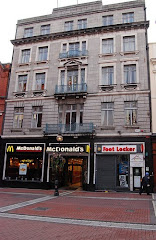Note: I was confused about how short this poem was, since it's only 2 stanzas in the copy of the poems that I downloaded, so I looked it up on Google. It's actually a lot longer, so I'm just going to give the full length I found the benefit of the doubt and base this post on it.
In a literal sense, John Montague's "The Cage" tells the story of a boy and his father living in Brooklyn. The father works underground and is said to be a notoriously unhappy man, drinking by the fire and reminiscing about Ireland. The parts of the work I found to be the most striking, however, are more subtle, dividing not only the father and son but Ireland and the United States.
With its quietly synpathetic yet distanced tone, the poem describes the relationship between the narrator and his father. It's clear that the narrator understands his father's pain and feels sympathetic, pointing out his "pallor" appearance and "ghostly forehead". He also recognizes that he's clearly unhappy, longing by the fire for life in Ireland before these "lost years in Brooklyn". He also shows an understanding of how chilling of a place Brooklyn is, commenting on how the subway "shudder[s] the earth". Even with this sympathy, however, a disconnection between the two is shown later in the poem. Even though they walk together in Ireland, for instance, the two don't smile together because they recognize it's only a dream. This suggests that like the walk in Ireland, a full connection between the two is actually an idealization. The ending scene also shows the narrator's distance despite his sympathy towards his father's situation. Sure, he notices how "ghostly" his father looks while descending into the subway, but the two are standing on different side of the booth's bars. He's an outsider looking into the pain of his father, not actually there to console or share it.
The divide between the United States and Ireland, too, is illustrated by the poem. Through his use of imagery, for instance, Montague suggests that Brooklyn is a cage, trapping the narrator's father as a solemn, hopeless prisoner. This is first evident when the father is described as having a look of "pallor" from working underground. He's pale and sickly from being confined in a dark, gloomy area, away from other people and daylight. The last stanza also solidifies this idea, as the narrator comments on seeing his father's head behind bars of the subway booth. The top of his bald head is scarred by a car accident, showing how vulnerable and damaged he is by the industrialization. Brooklyn seems to be holding him captive, locking him up in its dirty urbanization.
Ireland is characterized by the poem as well, but in a free and beautiful light. Though this is just a flashback, the narrator describes the open fields and plants in the town, his father even smiling at villages while walking by. Since this image follows the one of Brooklyn's sallow underground tunnels, the freedom and beauty of the green fields is obvious. The fact that he's traveling on a road also suggests freedom. Here, he can take control of the road and walk where he pleases; the Brooklyn subway, moving passengers according to its own route and confining them underground, controls the father. Since the father is "locked" in the Broolyn cage, though, his only escape to Ireland is through alcohol and his dreams.
Thursday, February 18, 2010
Subscribe to:
Post Comments (Atom)

No comments:
Post a Comment